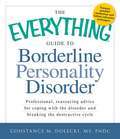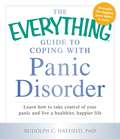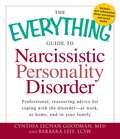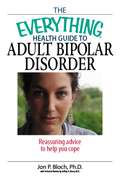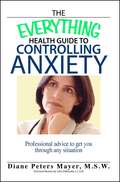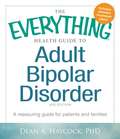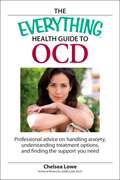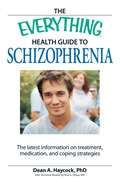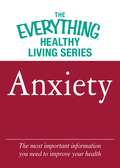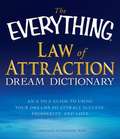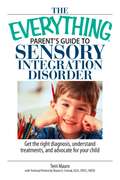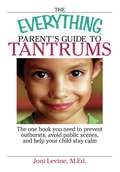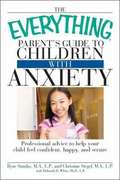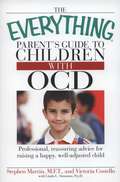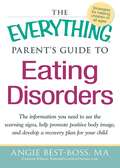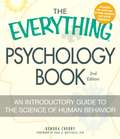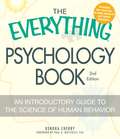- Table View
- List View
The Everything Guide to Borderline Peronality Disorder
by Constance M. Dolecki MS PhDcAffecting more than five million people in the United States, borderline personality disorder, also called emotional regulation disorder, has become more common than Alzheimer's, and nearly that of bipolar disorder and schizophrenia combined. Marked by bouts of violence and anger coupled with desperate and fixated love, this disorder is just now being recognized as a true mental illness. The Everything Guide to Borderline Personality Disorder is the professional yet compassionate guide that readers need to explore and understand the tumultuous world of BPD, offering information on: Experiences, trauma, and heredity as causes of BPD Warning signs and red flags from an early age Monitoring and recognizing extreme symptoms Different treatment options and therapies Maintaining safety in a relationship that involves BPD Featuring the latest therapy information on mindfulness meditation and behavioral relaxation, The Everything Guide to Borderline Personality Disorder is the comprehensive resource for families, spouses, and friends dealing with this psychological epidemic.
The Everything Guide to Borderline Personality Disorder
by Constance M. DoleckiAffecting more than five million people in the United States, borderline personality disorder, also called emotional regulation disorder, has become more common than Alzheimer's, and nearly that of bipolar disorder and schizophrenia combined. Marked by bouts of violence and anger coupled with desperate and fixated love, this disorder is just now being recognized as a true mental illness. The Everything Guide to Borderline Personality Disorder is the professional yet compassionate guide that readers need to explore and understand the tumultuous world of BPD, offering information on: Experiences, trauma, and heredity as causes of BPD Warning signs and red flags from an early age Monitoring and recognizing extreme symptoms Different treatment options and therapies Maintaining safety in a relationship that involves BPD Featuring the latest therapy information on mindfulness meditation and behavioral relaxation, The Everything Guide to Borderline Personality Disorder is the comprehensive resource for families, spouses, and friends dealing with this psychological epidemic.
The Everything Guide to Borderline Personality Disorder: Professional, reassuring advice for coping with the disorder and breaking the destructive cycle
by Constance M DoleckiAffecting more than five million people in the United States, borderline personality disorder, also called emotional regulation disorder, has become more common than Alzheimer's, and nearly that of bipolar disorder and schizophrenia combined. Marked by bouts of violence and anger coupled with desperate and fixated love, this disorder is just now being recognized as a true mental illness. The Everything Guide to Borderline Personality Disorder is the professional yet compassionate guide that readers need to explore and understand the tumultuous world of BPD, offering information on:Experiences, trauma, and heredity as causes of BPDWarning signs and red flags from an early ageMonitoring and recognizing extreme symptomsDifferent treatment options and therapiesMaintaining safety in a relationship that involves BPD Featuring the latest therapy information on mindfulness meditation and behavioral relaxation, The Everything Guide to Borderline Personality Disorder is the comprehensive resource for families, spouses, and friends dealing with this psychological epidemic.
The Everything Guide to Coping with Panic Disorder: Learn How to Take Control of Your Panic and Live a Healthier, Happier Life
by Rudolph C HatfieldConquer panic once and for all!Have you ever felt your heart race out of control for no reason? Everyone gets a little anxious now and again, but sometimes worry and fear can reach unhealthy limits. Panic disorder is a serious condition with symptoms that include sudden attacks of fear and nervousness, as well as physical symptoms such as sweating and a racing heart. With The Everything Guide to Coping with Panic Disorder, you'll learn how to gain control over panic and anxiety with a variety of helpful approaches. This guide includes information on:Symptoms and warning signs of panic disorderHow stress and anxiety affects you physicallyProfessional treatments and therapiesSelf-help anti-anxiety techniques you can do at homeLiving with panic disorder With detailed information treatments such as cognitive behavioral therapy, medication, and mindfulness exercises, The Everything Guide to Coping with Panic Disorder will give you an arsenal of anti-anxiety techniques so you can stop panic before it starts.
The Everything Guide to Narcissistic Personality Disorder: Professional, reassuring advice for coping with the disorder - at work, at home, and in your family (Everything® Series)
by Cynthia Lechan Goodman Barbara LeffLearn the ins and outs of Narcissistic Personality Disorder with this comprehensive, approachable guide.Narcissistic Personality Disorder, often mistaken for a too-big ego or inflated self-esteem, is in actuality a severe psychological condition that ruins marriages, social relationships, work environments, and the sufferer&’s own sense of self. Although perceived as self-confident and arrogant, narcissists are really victims of devastatingly low self-esteem and insecurity. The Everything Guide to Narcissistic Personality Disorder is a comprehensive resource for readers who need guidance, including information on: -Identifying the symptoms in themselves and their loved ones -Different types of narcissists -Living with a narcissistic (one-way) relationship -Treatment options and methods -Preventing narcissism in children and young adults -Recovering from a narcissistic relationship with a parent, spouse, or friend Complete with an exclusive section on the epidemic of &“net narcissism&” due to social media, The Everything Guide to Narcissistic Personality Disorder is the complete guide to a misunderstood disorder that impacts millions everyday.
The Everything Health Guide To Adult Bipolar Disorder: Reassuring Advice to Help You Cope
by Jon P BlochA Simon & Schuster eBook. Simon & Schuster has a great book for every reader.
The Everything Health Guide To Controlling Anxiety Book: Professional Advice to Get You Through Any Situation (Everything® Series)
by Diane Peters MayerIf you think you have an anxiety disorder, or you&’ve just been diagnosed with one, you&’re not alone. Almost 20 million Americans suffer from some type of anxiety disorder. The Everything Health Guide to Controlling Anxiety helps you identify different disorders, cope with phobias, and overcome stress in order to get through the day. Author Diane Peters Mayer helps you:Learn about the causes and characteristics of anxiety Get the facts on conditions linked to anxietyChoose a therapist and support groupFind the best medication and treatmentMaintain healthy family relationshipsPacked with the professional, authoritative advice you&’ve been searching for, The Everything Health Guide to Controlling Anxiety is a complete handbook for day-to-day living.
The Everything Health Guide to Adult Bipolar Disorder
by Dean A. HaycockExpert help for dealing with this complex diagnosis! If you or a loved one has been diagnosed with bipolar disorder, it can be confusing and overwhelming. What are the most effective treatments? Will therapy help? When will life return to normal? With The Everything Health Guide to Adult Bipolar Disorder, 3rd Edition, you can take charge and manage your condition, or learn the best ways to support your friend or family member. Author Dean A. Haycock, PhD, provides supportive advice on: Treatments, including alternative and nontraditional approaches Making the best lifestyle choices for you Dealing with mania and depression and how to stay in control Telling others you have bipolar disorder Recent changes in diagnostic criteria, and how they can affect you Finding support for yourself and your loved ones In this completely revised and updated edition, you'll find answers to all your questions--and the support you need to face this challenging condition.
The Everything Health Guide to Adult Bipolar Disorder
by Dean Haycock Sheldon Whitten-VileMore and more people are being diagnosed with bipolar disorder, which affects 2.6 percent of all American adults. This diagnosis can be scary for patients and their loved ones, but new medications, therapies, and lifestyle changes have transformed treatment and benefited patients. With this health guide, you'll find authoritative, reassuring advice on topics like:The causes of bipolar disorderCommon side effects to medicationsAlternative and nontraditional approachesMania and manic episodesLinks between bipolar and other disordersThis completely revised and updated edition includes the latest treatment options as well as recent studies and classifications. Bipolar disorder is a complex diagnosis. With this positive, supportive guide, you'll find the answers to all your questions--even the ones you haven't thought to ask.
The Everything Health Guide to Adult Bipolar Disorder: A Reassuring Guide for Patients and Families
by Dean A HaycockExpert help for dealing with this complex diagnosis!If you or a loved one has been diagnosed with bipolar disorder, it can be confusing and overwhelming. What are the most effective treatments? Will therapy help? When will life return to normal? With The Everything Health Guide to Adult Bipolar Disorder, 3rd Edition, you can take charge and manage your condition, or learn the best ways to support your friend or family member. Author Dean A. Haycock, PhD, provides supportive advice on:Treatments, including alternative and nontraditional approachesMaking the best lifestyle choices for youDealing with mania and depression and how to stay in controlTelling others you have bipolar disorderRecent changes in diagnostic criteria, and how they can affect youFinding support for yourself and your loved onesIn this completely revised and updated edition, you'll find answers to all your questions--and the support you need to face this challenging condition.
The Everything Health Guide to Adult Bipolar Disorder: Reassuring advice for patients and families
by Dean A HaycockMore and more people are being diagnosed with bipolar disorder, which affects 2.6 percent of all American adults. This diagnosis can be scary for patients and their loved ones, but new medications, therapies, and lifestyle changes have transformed treatment and benefited patients. With this health guide, you'll find authoritative, reassuring advice on topics like:The causes of bipolar disorderCommon side effects to medicationsAlternative and nontraditional approachesMania and manic episodesLinks between bipolar and other disorders This completely revised and updated edition includes the latest treatment options as well as recent studies and classifications. Bipolar disorder is a complex diagnosis. With this positive, supportive guide, you'll find the answers to all your questions--even the ones you haven't thought to ask.
The Everything Health Guide to OCD
by Chelsea LoweIf you have OCD, or suspect that you do, take heart-you're not alone. More than 5 million people suffer from the disease in the United States and there are a number of treatment options available. With The Everything Health Guide to OCD, you'll learn to cope with a variety of behaviors, including:Excessive touching; Hording; Compulsive handwashing; Disturbing thoughts; Germ-phobia; and Repetitive checking. From coping strategies to medical treatments, this reassuring guide gives you everything you need to keep your cool when anxiety attacks.
The Everything Health Guide to OCD: Professional advice on handling anxiety, understanding treatment options, and finding the support you need
by Chelsea LoweA Simon & Schuster eBook. Simon & Schuster has a great book for every reader.
The Everything Health Guide to Schizophrenia
by Dean Haycock Elias K. ShayaThe effects of schizophrenia can be devastating for both the 3.3 million adults living with the disease as well as their families and friends. This guide offers help to those who suffer from schizophrenia and their loved ones, including information on how to:Get a correct diagnosisUnderstand the various types of schizophreniaHandle resulting problems such as substance abuseFind the right doctorChoose and manage medicationsFind support from family, friends, and the communityVolunteer and spread awareness for the causeSymptoms of schizophrenia and resulting problems can be severe. In this book, readers find the information, reassurance, and advice they need to work toward a better life.
The Everything Health Guide to Schizophrenia: The latest information on treatment, medication, and coping strategies
by Dean A HaycockThe effects of schizophrenia can be devastating for both the 3.3 million adults living with the disease as well as their families and friends. This guide offers help to those who suffer from schizophrenia and their loved ones, including information on how to:Get a correct diagnosisUnderstand the various types of schizophreniaHandle resulting problems such as substance abuseFind the right doctorChoose and manage medicationsFind support from family, friends, and the communityVolunteer and spread awareness for the cause Symptoms of schizophrenia and resulting problems can be severe. In this book, you will find the information, reassurance, and advice you need to work toward a better life.
The Everything Healthy Living Series: Anxiety
by Adams MediaIf you or a family member is suffering from anxiety, you may feel overwhelmed by the challenges associated with this condition. The Everything® Healthy Living Series is here to help. These concise, thoughtful guides offer the expert advice and the latest medical information you need to manage your pain and lead a healthy life. Inside you’ll find expert advice and helpful tips on understanding anxiety, seeking help from therapist and support groups, finding the best medications and treatments, and thoughtful advice on helping family and friends understand your condition. Living with depression can be challenging, but with the right guidance you can live a happy and healthy life.
The Everything Law of Attraction Dream Dictionary (The Everything )
by Cathleen O'ConnorTurn dreams into goals and goals into reality with this dictionary! With this valuable guide you’ll learn to channel the power of the Law of Attraction as you sleep. You’ll identify your own symbolic dream language, and access the secrets of your subconscious. Once you realize your true desires, you can apply Law of Attraction principles and dream your way to:Create healthy relationshipsAttract success in your careerManifest an abundance of wealthFind--and keep--the perfect partnerEliminate stress and improve your healthWith more than 800 dream symbols and themes, this comprehensive resource is all you need to make your dreams come true!
The Everything Parent's Guide To Sensory Integration Disorder: Get the Right Diagnosis, Understand Treatments, And Advocate for Your Child
by Terri MauroFor kids living with Sensory Integration Disorder, the world can be a scary place, full of potentially stressful experiences. Kids with Sensory Integration Disorder can howl in discomfort over the feel of a shirt tag or a sock seam on bare skin. They may find the sound of a whisper to be as loud and frightening as a siren, and may perceive the caring touch of a parent or jostling in the school lunch line as equivalent to an assault.The Everything Parent's Guide to Sensory Integration Disorder:Provides an in-depth definition of Sensory Integration Disorder and explains its effectsHighlights occupational therapy treatments and explains techniques you can use outside of the therapist's office to calm your childIncludes helpful advice for parents teaching their children how to deal with this disorder at school, home, and play, from childhood through adulthoodIn The Everything Parent's Guide to Sensory Integration Disorder, you'll find the answers you need as you search for ways to help your child. This reassuring handbook examines various forms of treatment and therapy, and provides professional advice for helping children with SID succeed in school, at home, and with friends.
The Everything Parent's Guide To Tantrums: The One Book You Need To Prevent Outbursts, Avoid Public Scenes, And Help Your Child Stay Calm
by Joni LevineDoes your child kick and scream when he doesn't get his way? Have meal times and running errands become emotional battles? The Everything Parent's Guide to Tantrums is your authoritative handbook to understanding what causes your child to have tantrums and which measures you can take to combat their occurrence.Author Joni Levine helps you:Understand your child's temperamentIdentify external influences that trigger tantrumsAvoid responding emotionally to an outburstUse effective methods for calming your childDeal with tantrums in publicFilled with realistic advice and practical tips, The Everything Parent's Guide to Tantrums is your key to a happy, well-adjusted child and peace at home-and elsewhere.
The Everything Parent's Guide to Children with Anxiety: Professional Advice to Help Your Child Feel Confident, Happy, and Secure
by Ilyne Sandas Christine Siegel Deborah D. WhiteAll kids worry. But chronic worry turns into trouble when it becomes the focus of your child's life. For some children, anxiety is so overwhelming that it becomes paralyzing and prevents any forward movement. But, with the proper care and treatment, a child with an anxiety disorder can thrive. The Everything Parent's Guide to Children with Anxiety presents a balanced approach to treatment and helps you: Determine the causes of your child's anxiety, Decide on the right treatment and medication, Talk with your child about anxiety, Cope with symptoms, Find the right counselor, Educate and work with teachers and school officials. This handy guide gives you all the resources, tools, and information you need to help your child enjoy a happy, healthy, and well-adjusted childhood!
The Everything Parent's Guide to Children with OCD: Professional, Reassuring Advice for Raising a Happy, Well-adjusted Child
by Stephen Martin Victoria Costello Linda L. SimmonsIf you are the parent of one of the more than one million children with OCD, then you know what a confusing and disruptive disorder it can be. OCD can turn even simple tasks like homework and chores into almost impossible challenges. A child with OCD may feel stressed, worried, frustrated, frightened, and out of control.
The Everything Parent's Guide to Eating Disorders: The information plan you need to see the warning signs, help promote positive body image, and develop a recovery plan for your child (The Everything Books)
by Angie Best-BossYou don't know what to do. Your once happy, carefree child has begun abusing food and fallen into a pattern of disordered eating that is literally taking her life. You watch in horror as she binges and purges, starves herself, compulsively eats, or takes pills and supplements. There is no such thing as a harmless eating disorder. Your child is in danger and she needs your help.Children with an eating disorder need their parents to be prepared, engaged, knowledgeable, and ready to do battle on their behalf. With the professional, accessible advice presented here, you can get the support you need.This guide helps you:Promote positive body image--at any ageInstill healthy eating habitsRecognize warning signsFind the right treatment optionsStay positive and encourage your childThis book provides an all-encompassing look at eating disorders--the symptoms, the causes, and the treatments--so you can feel confident about the steps you need to take to help your child overcome this illness.
The Everything Psychology Book
by Lesley Bolton Lynda L. WarwickIn years past, psychology had been criticized as the stuff of "head-shrinkers" and "quacks." Now the study of human behavior is universally accepted as a means for better understanding one's self and achieving inner peace and happiness.The Everything Psychology Book is an easy-to-follow guide to the experiments, theories, and principles that have shaped modern psychology and given us insights into human behavior.From learning and personality development to dreams and the unconscious, this straightforward primer explains how the brain works and how our enviroment affects thinking and behavior.In addition to the sceintific information, readers learn how to apply what we know about psychology to improve everyday lives.
The Everything Psychology Book
by Lesley Bolton Lynda L WarwickIn years past, psychology had been criticized as the stuff of "head-shrinkers" and "quacks." Now the study of human behavior is universally accepted as a means for better understanding one's self and achieving inner peace and happiness.The Everything Psychology Book is an easy-to-follow guide to the experiments, theories, and principles that have shaped modern psychology and given us insights into human behavior.From learning and personality development to dreams and the unconscious, this straightforward primer explains how the brain works and how our enviroment affects thinking and behavior.In addition to the sceintific information, readers learn how to apply what we know about psychology to improve everyday lives.
The Everything Psychology Book: Explore the human psyche and understand why we do the things we do (Everything® Series)
by Kendra CherryWhat do dreams mean? How important is childhood, really? Why do we forget this--and remember that?There's nothing more fascinating--or frightening--than the ins and outs of the human mind. But understanding the complex links between our brains, our emotions, and our behavior can be challenging. This book unravels even the most arcane mysteries of psychology, including:The human drive for food, sex, and other desiresWhat happens when thinking and emotions go awryWhy we fall in love with one person and not anotherHow we can develop a strong sense of selfWhen traumatic events can change who we areScientific information is coupled with real-life examples to help you grasp the basic principles and theories of psychology. You'll be able to achieve a better understanding of yourself--and everyone else around you, too!
